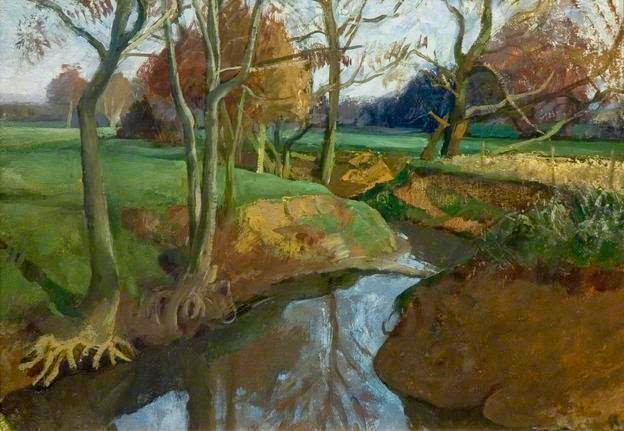As we enter another winter together, I worry about them. How will they fare in the cold and the wind and the gloom? But there they are in the garden, flitting about in the trees and bushes, hopping along the paths, going about the business of being robins.
A Robin
Ghost-grey the fall of night,
Ice-bound the lane,
Lone in the dying light
Flits he again;
Lurking where shadows steal,
Perched in his coat of blood,
Man's homestead at his heel,
Death-still the wood.
Odd restless child; it's dark;
All wings are flown
But this one wizard's -- hark!
Stone clapped on stone!
Changeling and solitary,
Secret and sharp and small,
Flits he from tree to tree,
Calling on all.
Walter de la Mare, The Fleeting and Other Poems (1933).
Dudley Holland, "Winter Morning" (1945)
De la Mare was writing in England, so his robin is a European robin, not an American robin -- a flycatcher, not a thrush. But I like to think that the two share certain affinities: a charming stolidity, staying power, and a cheerful stoicism.
And they both have their songs and notes. Different songs and notes, of course, but perhaps the underlying message is the same. "Synonyms for joy."
The Robin
Poor bird! I do not envy thee;
Pleas'd in the gentle melody
Of thy own song.
Let crabbed winter silence all
The winged choir; he never shall
Chain up thy tongue:
Poor innocent!
When I would please my self, I look on thee;
And guess some sparks of that felicity,
That self-content.
When the bleak face of winter spreads
The earth, and violates the meads
Of all their pride;
When sapless trees and flowers are fled,
Back to their causes, and lie dead
To all beside:
I see thee set,
Bidding defiance to the bitter air,
Upon a wither'd spray; by cold made bare,
And drooping yet.
There, full in notes, to ravish all
My earth, I wonder what to call
My dullness; when
I hear thee, pretty creature, bring
Thy better odes of praise, and sing,
To puzzle men:
Poor pious elf!
I am instructed by thy harmony,
To sing the time's uncertainty,
Safe in my self.
Poor Redbreast, carol out thy lay,
And teach us mortals what to say.
Here cease the choir
Of ayerie choristers; no more
Mingle your notes; but catch a store
From her sweet lyre;
You are but weak,
Mere summer chanters; you have neither wing
Nor voice, in winter. Pretty Redbreast, sing,
What I would speak.
George Daniel (1616-1657), "Ode XXIII," in Alexander Grosart (editor), The Poems of George Daniel, Volume II (1878) (spelling modernized).
"That self-content." Call me an anthropomorphizer, a practitioner of the Pathetic Fallacy, but "self-content" is one of the traits that I admire in the robin. "A robin with no Christian name ran through/The Robin-Anthem which was all it knew." "All it knew"? Yes, perhaps. But: "I am instructed by thy harmony . . . teach us mortals what to say."
Beryl Sinclair, "Winter, Regent's Park" (1941)
When I was young, we were taught to look for "the first robin of spring." But it has always seemed to me that quite a few of them stick around through the winter. Their red-orange breasts are a welcome sight amidst the dark days, and add to the gaiety should snow arrive. (Although I suppose that a snowfall is not necessarily a cause for celebration in the Robin-World!) Thus, I think of robins not just as harbingers of spring, but as year-long reminders of the constancy and continuity of the World that surrounds us, a World that calls for our attention in even its humblest manifestations.
Winter
Clouded with snow
The bleak winds blow,
And shrill on leafless bough
The robin with its burning breast
Alone sings now.
The rayless sun,
Day's journey done,
Sheds its last ebbing light
On fields in leagues of beauty spread
Unearthly white.
Thick draws the dark,
And spark by spark,
The frost-fires kindle, and soon
Over that sea of frozen foam
Floats the white moon.
Walter de la Mare, The Listeners and Other Poems (1912).
Frederick Mitchell, "Greig Close in Winter" (1955)
Poets rhapsodize about nightingales and skylarks. There are those among us who search the woods for cardinals, orioles, bluebirds, and others of bright plumage. But the commonplace, quotidian robin deserves its own paean. Please note that I do not use "commonplace" or "quotidian" in a pejorative sense. After all, both words apply to each and every one of us, although we may like to believe otherwise.
We need to often remind ourselves of this:
Learning
To believe you are magnificent. And gradually to discover that you are not magnificent. Enough labor for one human life.
Czeslaw Milosz, Road-side Dog (translated by Czeslaw Milosz and Robert Hass) (Farrar, Straus and Giroux 1998).
As I have noted here on more than one occasion, we are all in this together. We each have our offices to perform. Who among us is the humblest? Who among us is of importance? Who knows? None of us is in a position to render judgment.
To Robin Redbreast
Laid out for dead, let thy last kindness be
With leaves and moss-work for to cover me:
And while the wood-nymphs my cold corpse inter,
Sing thou my dirge, sweet-warbling chorister!
For epitaph, in foliage, next write this:
Here, here the tomb of Robin Herrick is.
Robert Herrick, Hesperides (1648).
"Where, when he dies, his tomb may be a bush,/Where harmless robin dwells with gentle thrush." Not a bad way to spend eternity, communing with robins and thrushes.
John Aldridge, "Winter" (1947)

















































